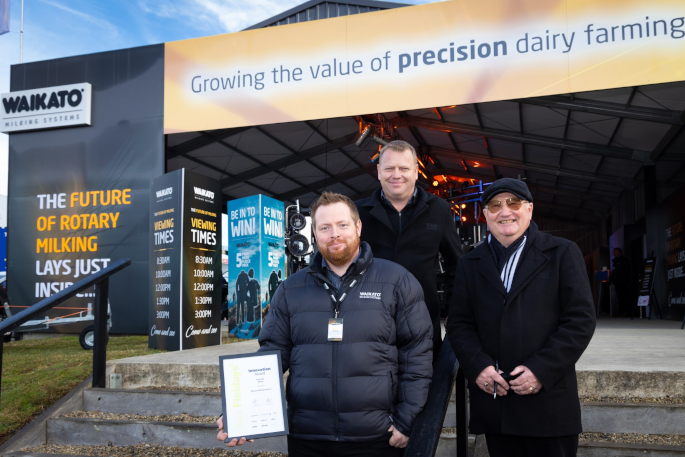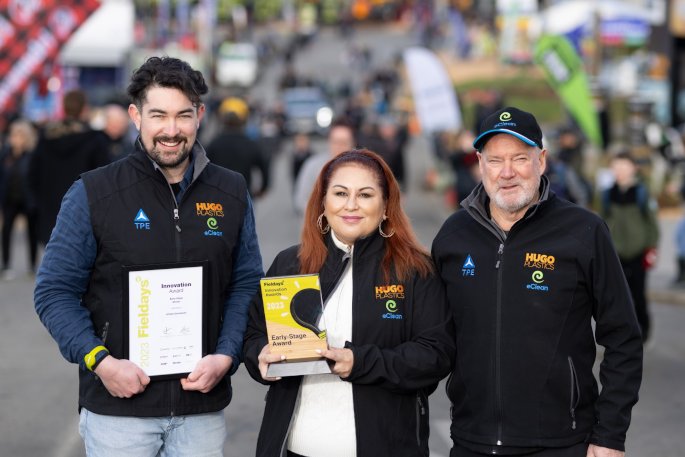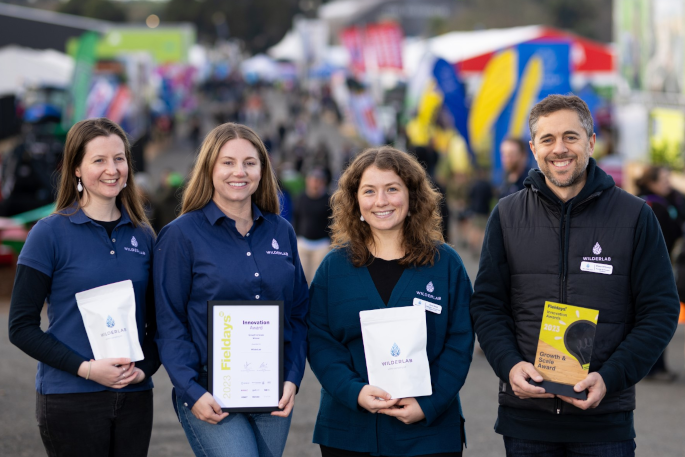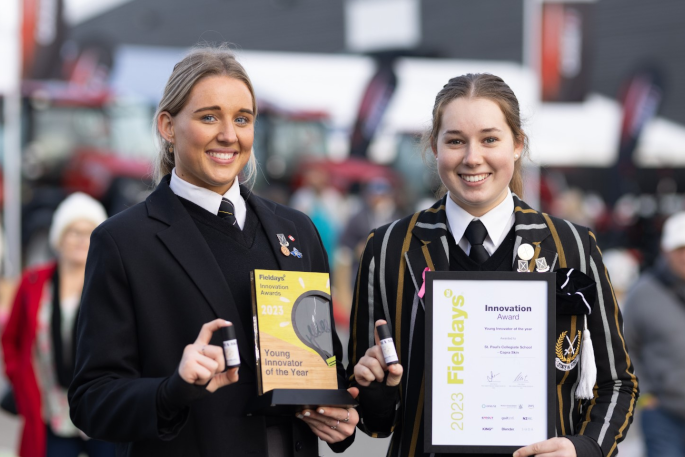Winners from up and down the country are celebrating after being recognised by Fieldays for the 2023 innovation awards.
'Innovation has always been at the forefront of Fieldays, since its onset in 1968, with the organisers, ongoing ambition being to advance agriculture in New Zealand by supporting and facilitating leadership in technology, innovation, education, and globalisation,” says an event spokesperson.
'The Fieldays Innovation Awards, starting that same year, was the first competition of its kind in New Zealand, and is now well-known as the platform for turning ideas of all shapes and sizes into marketable products to benefit the primary industry.”
The Awards offer three distinct categories: Prototype, Early-Stage, and Growth & Scale, encompassing the entire innovation lifecycle.
This opens the possibility of inventors entering different categories each year to showcase any recent progress or advancements made in the project.
Despite the 2022 Awards being held just six months ago, entrants were keen to showcase their progress and fresh thinking.
This year's Awards again paid tribute to the youth with the Young Innovator of the Year Award going to an eager group of high school students at St Paul's Collegiate School in Hamilton, for their Capra Skin Goats Milk lip balm. The group comprising of Lucy O'Meeghan, Emma Lobb, Mackenzie Lenton and Lochie Mouat, are in year 13, taking Agribusiness as a subject.
The students identified a need and formulated steps and iterations to develop a final product that could make a real difference to its target market.
They named their brand Capra Skin, drawing inspiration from the Latin word "Capra," meaning goat, which also doubles as an acronym for "Greatest Of All Time."
A representative from the group explains, "We want our customers to feel exceptional when using our product. We envision our product's story expanding beyond just lip balm and encompassing other skincare items in the future."
Chris Foot, the Agribusiness teacher at St. Paul's Collegiate, couldn't be happier with the performance of the three groups of students who pitched their ideas at the Fieldays Innovation Hub, saying 'They did well and put up convincing arguments under very difficult and nerve-wracking conditions. Their ideas were innovative, original, and clever; we are extremely proud of them.” The judges were equally impressed, praising the exceptional
Quality of the presentations and highlighting the professionalism demonstrated by the young participants.
Waikato Milking Systems, a company known for designing and manufacturing rotary platforms and milking systems won the Prototype Award for its ErgoPOD - a product hoping to revolutionise efficiency and safety in the milking shed.

Prototype Award winners from Waikato Milking Systems. Photo: Supplied.
Project Specialist at Waikato Milking Systems, Tom Morris and his team worked on research and development for four years to advance this project through to the prototype stage, and plan to complete the final stages of development over the next 18 months so they can go to market.
Waikato Milking Systems Executive Chairman Jamie Mikkelson accepted the award on the night saying, 'We started on this journey with this crazy idea to become the most admired company globally for milking efficiency. If a single operator could milk a thousand cows in an hour, it would be a game changer, and we believe we are on our way to achieve that with this machine.”
The team decided to enter the Fieldays Innovation Awards because they saw it as an opportunity, if they won, to introduce their innovative product to the dairy market as upcoming, which it has now successfully achieved.
'Winning this Award has been a massive pat on the back for the team, who deserve the accolade after having worked hard over the past few years to deliver a fresh take on a milking system that tackles the current limitations of traditional and robotic ones,” says Jamie.
'We plan to return to the 2024 Fieldays Innovation Awards in the Early-Stage category with a further developed product.”
Staff on-farm where the ErgoPOD is being trialled have provided feedback that cupping has become a much easier task once they were used to using the new technology.
They have also noticed that the milk out across all 4 quarters has become more consistent - which may be down to the cup weight and freedom that each 1/4 has with no claw bowl.
Jamie mentioned that Riley, a milker on the trial farm, has been challenging himself to see how fast and accurately he can handle the system and has been achieving 3 1/2 seconds or less for cupping all 4 quarters.
The winners of the Early-Stage Award are eClean Envirotech, led by founder Ngārie Scartozzi.

Early-Stage Award winners from eClean Envirotech Photo: Supplied.
The company partnered with an engineering firm early on, to be able to manufacture their low-cost water filtration system from the start, and today have already reached early commercial success here in NZ. Ngārie previously worked at an Australian aquaculture company helping design filters for use in fish holding tanks.
'That role ignited my passion for water quality, control, and restoration of our global waterways,” says Ngārie.
For 15 years, Scartozzi says, she had been thinking about the technology behind her bioreactors, but it was only when she returned to New Zealand, and discovered water quality in the region had deteriorated, that she first conceptualised them in their current form.
eClean bioreactors use microbes (bacteria and other organisms) to remove nitrates, phosphates, and other contaminants from water.
The bioreactors are intended for use in low-flow environments such as farm drainage channels, streams and lakes and can potentially help dairy farmers comply with nutrient limits, allowing them to maintain herd numbers and farm more sustainably.
Of Māori heritage and from the Iwi of Ngāti Porou on the East Coast of the North Island, Ngārie considers herself kaitiaki, or a guardian of natural resources and says her vision is to use both scientific research and Mātauranga Māori to deliver technology to a global market. eClean's 'Engineered Microbiome' technology is currently showcased in several research projects in NZ targeting Nitrates, E.coli and heavy metals using biological filtration.
Wilderlab, a newcomer to the competition, received the Growth & Scale Award for their new ecological health index which utilises the power of environmental DNA (eDNA) technology.

Growth and Scale Award winners from Wilderlab. Photo: Supplied.
Their taxon-independent community index (TICI) incorporates DNA sequence information from fish, insects, plants, mammals, birds and microorganisms living in an area to provide a score to gauge ecological health and track small shifts in condition.
'By using a comprehensive panel of tests, we can capture a picture of the larger ecosystem, not just the species we can find and identify visually” says Freshwater and Community Science lead, Amy Gault.
The simplicity of the eDNA kits, requiring the user to filter a few cups of water, means it's accessible to everyone, from ecologists to school children.
A timely example of Wilderlab's eDNA product in action is the tracking of the highly invasive golden clam, Corbicula fluminea in the Waikato River. 'eDNA monitoring enables us to map the invasion front, allowing for intervention to prevent its spread into other rivers and lakes,” says Wilderlab's Founder and Principal Scientist, Shaun Wilkinson. Wilderlab's services are now being used by government, primary sector organisations, and various community groups.
The Fieldays Innovation Awards is supported by Fieldays Partners; One NZ and the Ministry for Primary Industries, and Sponsors; Amazon Web Services, Sprout Agritech, and NZME, and Advocates; Gait International, King St. Advertising, Blender Design, and Soda Inc., who all contribute to a prize package valued at over $60,000 worth of cash, support and promotion - from expert advice, product design and development, and marketing and media support, all designed to help the winners grow and develop their product at an accelerated pace.
Steve Chappell, on behalf of the New Zealand National Fieldays Society, expressed gratitude to the finalists and award winners from the 2023 Fieldays Innovation Awards.
'We proudly follow their journeys through the Fieldays Innovations Hub and beyond, and are curious to see how this year's finalists go on to impact the NZ innovation eco-system, and then take their products on to global success," says Steve.
Fieldays Innovation Awards entries for 2024 will open after a short period of review, and expressions of interest can already be made online at http://www.fieldays.co.nz/innovation.



0 comments
Leave a Comment
You must be logged in to make a comment.